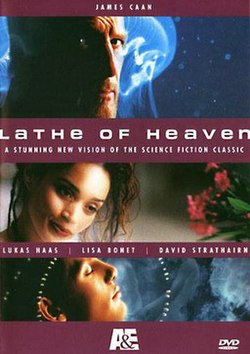| Lathe of Heaven | |
|---|---|
 DVD cover | |
| Genre | |
| Based on | The Lathe of Heaven by Ursula K. Le Guin |
| Written by | Alan Sharp |
| Directed by | Philip Haas |
| Starring | |
| Music by | Angelo Badalamenti |
| Country of origin | United States |
| Original language | English |
| Production | |
| Executive producers |
|
| Producer | Mark Winemaker |
| Production location | Montreal |
| Cinematography | Pierre Mignot |
| Editor | Jean-François Bergeron |
| Running time | 91 minutes |
| Production companies |
|
| Original release | |
| Network | A&E |
| Release | September 8, 2002 |
Lathe of Heaven is a 2002 American science fiction television film based on the 1971 novel The Lathe of Heaven by Ursula K. Le Guin, which was previously adapted as a television film in 1980. The film was directed by Philip Haas, written by Alan Sharp, and stars James Caan, Lukas Haas, and Lisa Bonet. It aired on A&E on September 8, 2002. It was nominated at the 29th Saturn Awards for Best Single Program Presentation. [1]